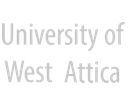Information Literacy Service: SWOT Analysis
Abstract
Abstract
Purpose - Information Literacy (IL) has nowadays a primary and substantial role within Academic Libraries worldwide. Aiming to respond to the new trends of education that the information society calls for, the Central Library of the National Technical University of Athens (NTUA) has developed the Service “Information Literacy Workshops”. The purpose of this paper is to describe the development of an Information Literacy (IL) Service in the context of a Hellenic Academic Library, by discussing the Strengths, Weaknesses, Opportunities and Threats that this project’s team encountered.
Design/methodology/approach – Five IL workshop cycles took place in the NTUA Central Library. The first cycle was addressed to the NTUA library staff, endeavouring to establish a “learning organization” culture; three cycles were addressed to the NTUA graduate students and one cycle to post-graduate students. Each IL workshop cycle was designed, implemented and evaluated after consideration, study and adaptation of the international IL standards and strategies, as well as of four learning theories (Behaviorism, Social/Cognitive Behaviorism, Cognitivism and Constructivism) and by utilizing services and tools developed in the past by HEAL-Link within the framework of the Program “Digital Convergence”.
Findings - The library, as part of an interconnected academic ecosystem, and especially because the volume of data available on the Internet is shockingly high and constantly increasing, should evolve and enhance its viability mainly through its intra and extra-institutional collaborations and through its active involvement in the curriculum design with a vision to establish an “information literacy” culture.
Originality/value – This paper enhances academic librarians’ understanding of an IL Service’s development in three ways: firstly, by narrating a real story with failures and successes and thus offering the chance to reflect upon them; secondly, by deepening in this project’s design, implementation and evaluation; thirdly, by proposing better practices that could urge Hellenic Academic Libraries to create from scratch their own IL Service or to develop their existed one further.
Keywords
References
Corrall, S. (2008). “Information literacy strategy development in higher education: An exploratory study”. International journal of information management, 28(1), pp.26-37.
Efthymiou, F., Kouis, D., Zidropoulos, S. (2008). "A survey of the academic staff of the N.T.U.A. for the library use and for information literacy." Paper presented at the 1st Scientific Symposium: Information Literacy and Greek Higher Education, Volos: University of Thessaly Library, December 11-12, 2008. http://ilsym.lib.uth.gr/files/Efhtimiou_et_al_ft.pdf
Kokkinos, D., Papadatou, E., Sisamaki, N., (2008). “Information Literacy and User Education in NTUA Central Library", Paper presented at the 1st Scientific Symposium: Information Literacy and Greek Higher Education, Volos: University of Thessaly Library, December 11-12, 2008. http://ilsym.lib.uth.gr/files/Kokinos_et_al_ft.pdf
ILSeab web service of informational support, training and documentation for the benefit of both end users and librarians of Greek academic libraries. http://ilseab.lib.uth.gr/portal/index.php/en/
HEALLEAGAL. https://legal.heal-link.gr/
Mapulanga, P., (2013). “SWOT analysis in the planning of information services and systems in university libraries: The case of the University of Malawi strategic plans”. The Bottom Line, 26(2), pp. 70-84.
Limwichitr, S., Broady-Preston, J., Ellis, D., (2015). “A discussion of problems in implementing organisational cultural change: Developing a learning organisation in university libraries”. Library Review, 64(6/7), pp. 480-488.
Efthymiou, F. (2008). "Can a Library or Information Service be transformed into a 'learning organization' for its human resources and what could it do to adopt a learning culture?" Libraries and Information, 20, pp. 17-27.
Salvaras G., Salvara M. (2011). Teaching models and strategies, Athens: Diadrasi.
IFLA, 2006. Guidelines for Information Literacy in Lifelong Learning. https://ifla.org/files/assets/information-literacy/publications/ifla-guidelines-el.pdf
Kasowitz-Scheer, A., & Pasqualoni, M., (2002). Information literacy instruction in higher education: Trends and issues. http://surface.syr.edu/cgi/viewcontent.cgi?article=1032&context=sul
Klapsopoulos, I., Balatzaras, M., Zapounidou, S., & Patrinos, D. (2016). Hellenic Academic Libraries and Information Literacy Services: the development of the ILSEAB Online Education Platform. HealJournal, 2(1), pp. 29-46. http://healjournal.seab.gr/index.php/hli/article/view/82/53
Greene, J. A., Copeland, D. Z., Deekens, V. M., & Seung, B. Y., (2018). “Beyond knowledge: Examining digital literacy's role in the acquisition of understanding in science”. Computers & Education, 117, pp. 141-159.
Knoblock, et al. (1998). Modeling web sources for information integration. In AAAI/IAAI, pp. 211-218. https://www.aaai.org/Papers/AAAI/1998/AAAI98-029.pdf
Bell, F., (2011). “Connectivism: Its place in theory-informed research and innovation in technology-enabled learning”. The International Review of Research in Open and Distributed Learning, 12(3), pp. 98-118.
ACRL (2019). Framework for Information Literacy for Higher Education.
http://www.ala.org/acrl/standards/ilframework
Dubicki, E., (2019). “Mapping curriculum learning outcomes to ACRL's Framework threshold concepts: A syllabus study”. The Journal of Academic Librarianship, 45(3), pp. 288-298.
Clairoux, N., Desbiens, S., Clar, M., Dupont, P., & St‐Jean, M., (2013). “Integrating information literacy in health sciences curricula: a case study from Quebec”. Health Information & Libraries Journal, 30(3), pp. 201-211.
Polymeraki, F., (2018). "Ways of Instituting Information Literacy in Higher Education. The case of the Library and Information Center of The University of Macedonia". Paper presented at the 24th Panhellenic Congress of Academic Libraries, Larissa, TEI of Thessaly, 2018.
DOI: 10.26265/jiim.v4i1.4395
Refbacks
- There are currently no refbacks.






